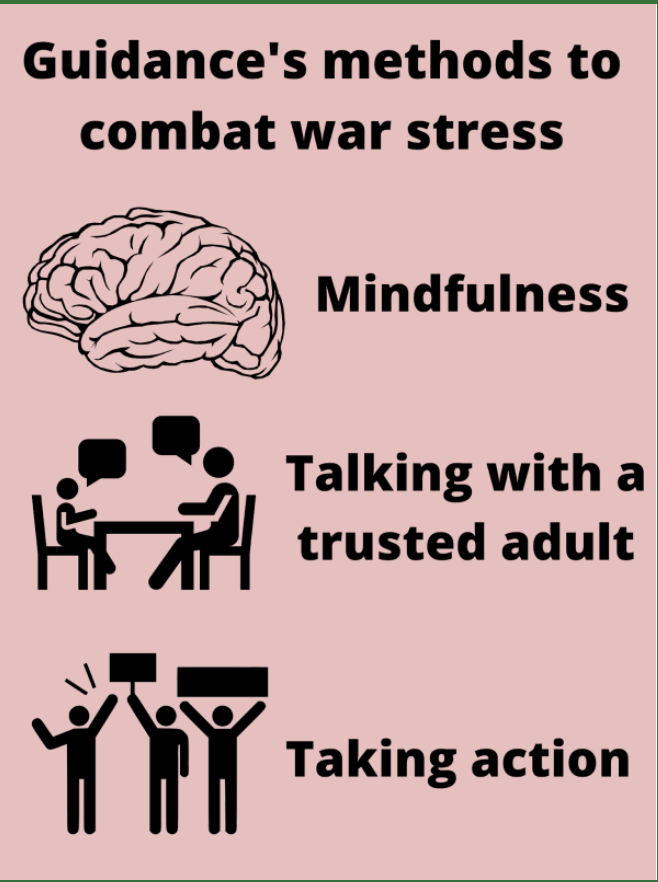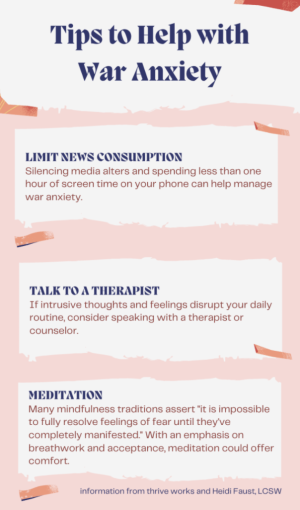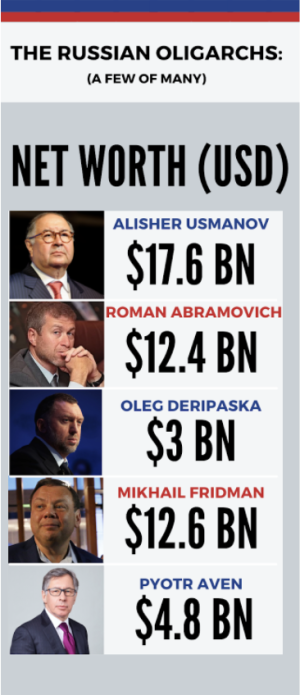Guidance advice mitigates Russian-Ukraine war stress, some skeptical
Graphic by Samantha Sandrew ’25
Guidance counselors recommend methods to mitigate war-induced stress, regardless of many students shying from opening up about the topic.
You sit in class watching the minutes tick by while the teacher continues their lecture. You have seen the news. You know that every movement the clock hands make is filled with destruction. 11:42. Dead. 11:43. Bomb. 11:44. Migrants. You lay on your rickety desk and visualize the world burning.
Due to the stress caused by the Russian-Ukraine conflict, guidance counselors advise mindfulness, action and a sound support system; however, some students are skeptical that guidance can help.
The war has reached all corners of the world. There is a constant bombardment of information from every news outlet that overwhelms individuals. It is important to stay informed because of its impact around the world, but guidance advises being mindful of content consumption.
“You have to be careful of the amount of exposure you have to information all the time,” William Plunkett, the director of guidance, said. “Some of which is really good factually rounded information and helpful to be informed about what’s going on and the other is completely erroneous. You really need to dissect the information that is coming your way.”
When ingesting information, Plunkett recommends reflecting with a trusted adult because it will help process emotions.
“In general a really good thing is making sure there are trusted adults you can go to,” Plunkett said. “Whether that is a teacher, a counselor, a coach, a job supervisor, or family member Knowing that there are people you can turn to to talk openly about what you might be experiencing.”
Plunkett suggests that a counselor is always an option as an outlet as one of guidance’s responsibilities is to offer support.
There are, however, some students who think guidance may not be the best outlet in this situation. Oliwia Kaczynska ‘22 was born in Poland and her family also resides there. Kaczynska struggles to see how guidance can offer sufficient support because she doubts their ability to understand her story.
“From past Staples experience, I don’t think they would have input, that they would be able to relate to my story or be able to give sufficient support,” Kaczynska said. “No offense to them, but I just don’t think they would be able to provide what a student needs at that time.”
Others have faith that the school’s aids are high quality.
“I’ve heard the services at guidance are of a really high caliber,” Krishin Wadhwani ’22 said. “So if you do take advantage of them they are incredible.”
Because the conflict is located across the globe, students may feel anxious about an inability to help. The community has reacted by organizing events and clubs. Even the most minor actions can help both the war and your state of mind.
“A good way to combat stress in a situation like this is to feel like you can do something. It doesn’t have to be putting together this massive fundraiser. It could be supporting community efforts to raise money or raise awareness or doing a rally,” Plunkett said. “But it also could be very simple just thinking about the ways you interact with other students and people in the community and treating each other kindly.”
It is essential to be kind to one another and support everyone to create a safe environment in these dire times.
“You can’t control a lot of what’s going on there,” Plunkett said. “But, you can control things that happen here and just the way we treat one another.”

Web Managing Editor Samantha Sandrew ’25 finally found her calling in Advanced Journalism after four years: broadcasting.
Since joining the class...





















































